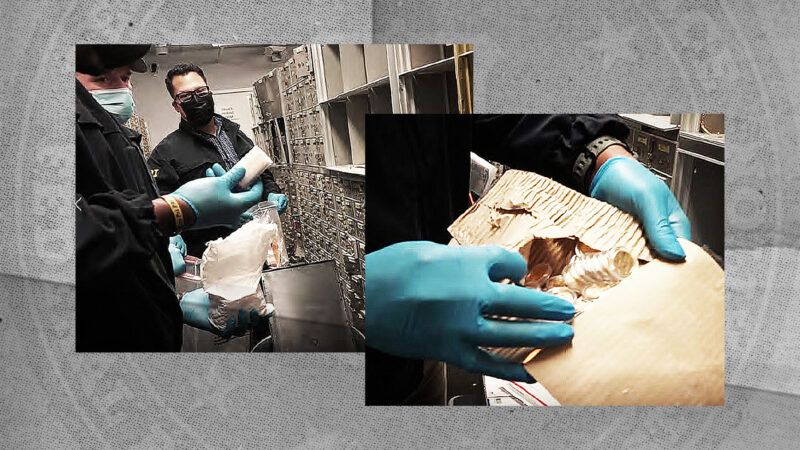Federal Judge Decides Safe Deposit Boxes Aren't Safe From FBI
Judge Gary Klausner admits that the FBI probably hid their true motives in rifling through the contents of hundreds of safe deposit boxes, but says that's fine.

The FBI seemingly misled a federal magistrate judge to obtain a warrant that let it seize the contents of hundreds of safe deposit boxes. But a federal judge says the raid did not violate the box owners' Fourth Amendment rights.
Judge Gary Klausner ruled Thursday that attorneys representing several victims of the FBI's March 2021 raid of U.S. Private Vaults in Beverly Hills, California, have "failed to prove" that the FBI's inventory of the safe deposit boxes' contents was "an impermissible investigatory motive" intended to uncover additional crimes beyond those alleged in the warrant that allowed the raid.
As Reason has previously detailed, the warrant for the raid explicitly forbade law enforcement from seizing or searching the private property contained in the safe deposit boxes held at U.S. Private Vaults, which was the target of the FBI's investigation. Despite that, field agents cracked open the boxes and rifled through them—and even ran some of the contents past the noses of drug-sniffing dogs—in what the FBI claims were a necessary inventory of the property but looks more like a fishing expedition. Attorneys for the box owners noted that FBI agents admitted during depositions that they planned to forfeit cash and other valuables from the boxes, even though they did not include those plans in the warrant application.
"There can be no question that the government expected, or even hoped, to find criminal evidence during its inventory," Klausner wrote in Thursday's ruling. Elsewhere, the judge pointed out that the plaintiffs' attorneys "have certainly shown that the government had a dual motive in inventorying the contents of each deposit box."
"But that is not enough." he added. "They must demonstrate that the improper investigatory motive was the only reason that the government opened the safe deposit boxes, and they have not done so."
That conclusion effectively relegates any protections for private property to the trash can. What Klausner says, in effect, is that as long as law enforcement had at least one legitimate reason (the inventory) for opening the boxes, it can use that reason to cover all manner of rights violations.
Of course, that's not how the federal prosecutors who handled the case see it.
"Contrary to the assertions made by the plaintiffs and adopted by some in the media, investigators were open and honest with the court that authorized the search and seizure warrants," Thom Mrozek, a spokesman for the U.S. Attorney's Office in Los Angeles, in a statement. "This ruling demonstrates that the actions taken in relation to a business that catered to criminals were legally authorized, adhered to policy, and were conducted in full compliance with the Constitution."
Rob Johnson, a senior attorney with the Institute for Justice, a libertarian law firm that is representing the box owners, says there is "no question" that Klausner's ruling will be appealed to the Ninth Circuit Court of Appeals in the near future.
"The decision will give a blueprint for the government to pry open safe deposit boxes, storage lockers, and other private spaces—and to take the contents with civil forfeiture," Johnson declared in a statement. "In other words, the decision gives law enforcement a license to concoct bogus reasons to seize and forfeit millions of dollars in property from people who have not been accused of doing anything wrong."


Show Comments (66)